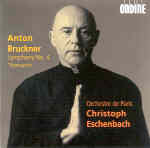Christoph Eschenbach really knows his Bruckner, and he turns in a very impressive performance of the Fourth Symphony ably supported by fine if not quite ideal playing from the Orchestre de Paris. One of the most gratifying aspects of this interpretation lies in the fact that the conductor knows that haste at the climaxes is positively fatal in this music, and for that reason his habit of broadening the tempo at climaxes rather than speeding up pays handsome reward in emphasizing that special Brucknerian grandeur that goes a long way toward minimizing any potential dullness. You can hear this approach work especially well in the Andante, which at 17 minutes ought to sound slow but somehow never really does, so accurately does Eschenbach shape the music’s long phrases and so confidently does he project its flow.
The opening of the symphony also doesn’t sound quite like anyone else’s performance. It’s quite slow, and when the fortissimo crashes in, Eschenbach refuses to pick up the tempo. A quick glance at the score reveals the tradition of speeding up into the first tutti to be spurious, however understandable or effective. So where most performances present the opening horn calls as an introduction followed by an allegro, Eschenbach demonstrates that those horn calls are actually the symphony’s principal theme, and the fortissimo outburst is the real transition to the lyrical second subject (which contrasts effectively with what has come before). It’s the kind of structural point that Klemperer’s performances often made, and it profoundly changes the complexion of the movement. You also will appreciate the rounded brass sonority that Eschenbach draws from his French players, and the fact that even at the loudest climaxes they never cover the strings.
In the climaxes of the scherzo I might have wished for a bit more cut and thrust from trumpets and trombones; similarly the big unison theme that opens the finale could have done with greater weight and a richer string tone. But here once again we see that advantage to Eschenbach’s habit of allowing the brass-laden climaxes plenty of room to expand while keeping things moving in Bruckner’s “song-period” second subjects. The symphony’s coda builds up to a very satisfying conclusion, one that has real inevitability given what has come before, and happily the applause at the end doesn’t erupt until the music dies away, which gives you just enough time to stop the disc and leave it out entirely (which of course is what Ondine should have done; we don’t need anyone to tell us how good the performance was).
As I suggested above in my remarks about the good balances, this is a very well engineered release, warm and clear with enough resonance to capture the climaxes effectively. It has to be said, though, that the Orchestre de Paris is not an ideal Bruckner orchestra. The lower strings could dig into their parts more strongly; the timpanist tries hard to put a firm bottom on the sound but doesn’t quite rank with the best; and it seems that the brass tire slightly in the first half of the finale (but they certainly rise to the occasion at the very end). Thus, in all respects this is Eschenbach’s show, an impressive tribute to his ability to impose his will on the players and carry them along in music by a composer that “non-specialist” ensembles often find anathema and play accordingly.
When I heard that this would be the first release in conductor and orchestra’s new relationship with Ondine, I had my reservations, but in the end I find myself impressed even though there are better Bruckner Fourths out there (including the versions listed above). It might be that under studio conditions some of the executional flaws could have been cleaned up, but then there’s something to be said for the sense of occasion, warts and all, that this recording captures. Certainly Eschenbach’s ideas about the music are interesting enough to deserve the attention of Bruckner collectors, and only time will tell if he can transform this ensemble into one able to enter fully into his personal vision of the composer’s musical world. [2/9/2004]
































